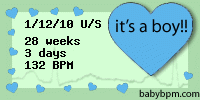Your pregnancy: 31 weeks (this is probably about the point I was born to my birth mom, incidentally since I was a 3 lb baby and a preemie)
How your baby's growing:
This week, your baby measures over 16 inches long. He weighs about 3.3 pounds (try carrying four navel oranges) and is heading into a growth spurt.
He can turn his head from side to side, and his arms, legs, and body are beginning to plump out as needed fat accumulates underneath his skin. He's probably moving a lot, too, so you may have trouble sleeping because your baby's kicks and somersaults keep you up.
Take comfort: All this moving is a sign that your baby is active and healthy.
Note: Every baby develops a little differently — even in the womb. Our information is designed to give you a general idea of your baby's development.
How your life's changing:
Have you noticed the muscles in your uterus tightening now and then? Many women feel these random contractions — called Braxton Hicks contractions — in the second half of pregnancy. Often lasting about 30 seconds, they're irregular, and at this point, they should be infrequent and painless.
Frequent contractions, on the other hand — even those that don't hurt — may be a sign of preterm labor.
Call your practitioner immediately if you have more than four contractions in an hour or any other signs of preterm labor: an increase in vaginal discharge or a change in the type of discharge (if it becomes watery, mucus-like, or bloody — even if it's pink or just tinged with blood); abdominal pain or menstrual-like cramping; an increase in pressure in the pelvic area; or low back pain, especially if you didn't have it before.
You may have noticed some leaking of colostrum, or "premilk," from your breasts lately. If so, try tucking some nursing pads into your bra to protect your clothes. (And if not, it's certainly nothing to worry about; your breasts are making colostrum all the same, even if you don't see any.)
If your current bra is too snug, you might also want to pick up a nursing bra. Choose a nursing bra at least one cup size bigger than you need now. When your milk comes in you'll be grateful for that extra room!
If you're having a boy, you and your partner will want to take some time to think about whether or not to have your baby circumcised. Find out the pros and cons from your doctor, and what the procedure involves.
Choosing a focal point "I'm 31 weeks along, and at my childbirth classes they've been telling us to concentrate on a focal point during labor. Anything from a picture to a crack in the wall or ceiling can work, so long as it helps Mom relax and distracts her from the pain." — Anonymous
Decision Guide: Do you want pain medication during labor?
There's no one right way to have a baby. Every woman's experience with pain is different and every labor is different.
Some women know in advance that they want pain medication. Some are committed to a natural, unmedicated approach to pain management. And some want to try for a drug-free birth with the option of pain medication if the going gets too rough. Learn all you can about the pros and cons of the various options so that you can make an informed choice.
Here are some things to consider as you make your decision:
• If you haven't done so already, sign up for a childbirth education class with your partner. Instructors generally cover all labor pain relief options, including epidurals, spinals, and systemic medication as well as drug-free approaches like breathing and relaxation techniques.
• Most women opt for some kind of pain medication during childbirth. The most popular form of labor pain relief, an epidural, delivers continuous pain relief to the lower part of your body while allowing you to remain fully conscious.
• Some women choose a natural, drug-free approach to controlling labor pain. If you want to remain in control of your body to the greatest extent possible, be an active participant throughout labor, and have minimal routine interventions in the birth process, then natural approaches will suit you best. If you choose to go this route, you accept the potential for pain and discomfort as part of giving birth, but with the right preparation and support, you may find it works well for you.
• Whether you've decided to use pain medication during labor or are committed to natural childbirth, remember that you have the right to change your mind once you're in labor.
• Take our poll: Have you decided to use drugs during childbirth?
This Week's Activity:
You don't need to pack your bag yet, but start making a list of items to bring to the hospital.
Besides a change of clothes and a toothbrush, some items to include:
• A photograph or object to focus on during labor
• Snacks to keep your energy up and gum or mints for bad breath
• Cozy socks and slippers
• Your favorite pillow
• Some light reading material
• A nursing nightie and nursing bra
• A going-home outfit for your baby
• A camera or camcorder, fresh batteries, and film, if necessary
A successful use of the potty
-
On the 6th, Baby Girl pulled off her diaper, walked over to the potty, sat
on it and peed. I was very impressed. It was only the 3rd time she's gone
on the...
13 years ago




